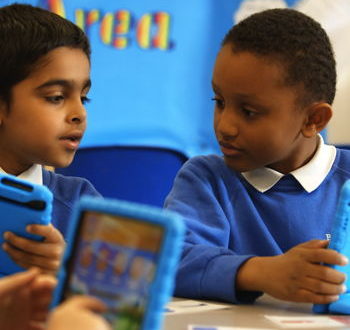Years ago the only place you’d have found a video game in a school would’ve been the teacher’s confiscation drawer. But now Minecraft has made its way into lessons, so are teachers starting to see any benefits? Jade Burke finds out…
Computer games have often been misassociated with violence and lazy behaviour, but now some schools are starting to integrate games into their lessons to encourage learning in school.
For example, one such game that is now a fixture in some schools is the sandbox construction game Minecraft, owned by Microsoft, which sees players break and place blocks. As part of a tech project in Northern Ireland, the game will also be made available to every post-primary school, to help inspire creative writing and engross pupils in city planning.
A Microsoft spokesperson tells PCR: “One of the key things we’re hearing from teachers and seeing in the industry is how effective it is when young people learn through having fun. That can happen in a variety of different ways, including through gaming, from the youngest to the more advanced students.”
For some kids, writing and spelling can be quite a chore, while others may struggle concentrating on topics in schools. English teacher Simon Baddeley from the Freeston Academy school, says Minecraft can combat this.
He says: “My job as an English teacher is to find a way to motivate my learners so that they are willing to disregard the work feeling and want to write something.
“I need to significantly camouflage the learning so that the ‘work’ is hidden and doesn’t feel like a chore.”
While games such as Minecraft have made their way into schools, Skoolbo is a learning company that has developed an educational game to aid reading and maths in schools. This lets students create an avatar in a 3D world.
Having launched in September 2014, Skoolbo is free for schools, teachers, parents and children to use, and it’s now in over 4,700 schools across the UK.
“Children love games and learn best when they’re happy and engaged,” adds Colin Brown, chief operating officer at Skoolbo.
“Games in schools provide the opportunity to embed key literacy and numeracy skills in a fun and efficient way, freeing teachers to focus on the application of skills and higher order thinking with their students.”
But will the introduction of games replace the idea of traditional schoolwork, taking away the formal environment most children are used to, or will it continue to assist with children’s learning?
Shane Hill, founder of Skoolbo, believes it will undoubtedly benefit schools: “The opportunities the technology opens up are just astounding, and in terms of learning, it can be of tremendous assistance.
“You’ll never replace school, of course you won’t, but you can enhance what they do and keep children motivated and ensure they don’t slip between the cracks,” explains Hill.
Similarly, some schools are also looking to gamify the process of learning, using technology and new ways to help increase a student’s interest in a subject they may not find as exciting as others. This process of gamification is picking up and is something that Baddeley thinks more schools should take on.
He explains: “Above all, gamers are free to ‘fail’. By failing they learn, they research and they grow. If a gamer can’t proceed, they experiment, they search for answers, they ask peers for advice and they act on what they find. Isn’t this what we want from our learners?”
But what about wearables and virtual reality sets, could these eventually find a place in schools now that gaming is increasing? It seems possible since big vendors such as Microsoft are dabbling in the virtual reality sector with its up and coming HoloLens.
Students may be able to work within a 3D world using games such as Minecraft on tablets, rather than working from a traditional monitor screen, which could open up many more opportunities for learning in lessons.
Baddeley explains: “Hololens was unveiled and showcased by the Mojang team at the E3 trade show recently and represents a massive innovation in the possibilities of using Minecraft in education.
“For me the absolute dream team of technology in the classroom would be for every student to use a Surface Pro 3 tablet with MinecraftEdu running on each one and using OneNote as a collaboration tool.”
Now that some games are no longer banned from schools, but are being pushed to promote learning and boost confidence in lessons, it seems there is no end to the benefits of the likes of Skoolbo and Minecraft.
“A game such as Minecraft is particularly powerful as it encourages students of all abilities to take control of their own challenges, work together and persevere to achieve specific, and often amazing goals, and to continue their learning beyond the classroom,” the Microsoft spokesperson comments.
Image source: Skoolbo
PCR’s Sector Spotlight on Education is running throughout August – click here for more articles
 PCR Tech and IT retail, distribution and vendor news
PCR Tech and IT retail, distribution and vendor news



